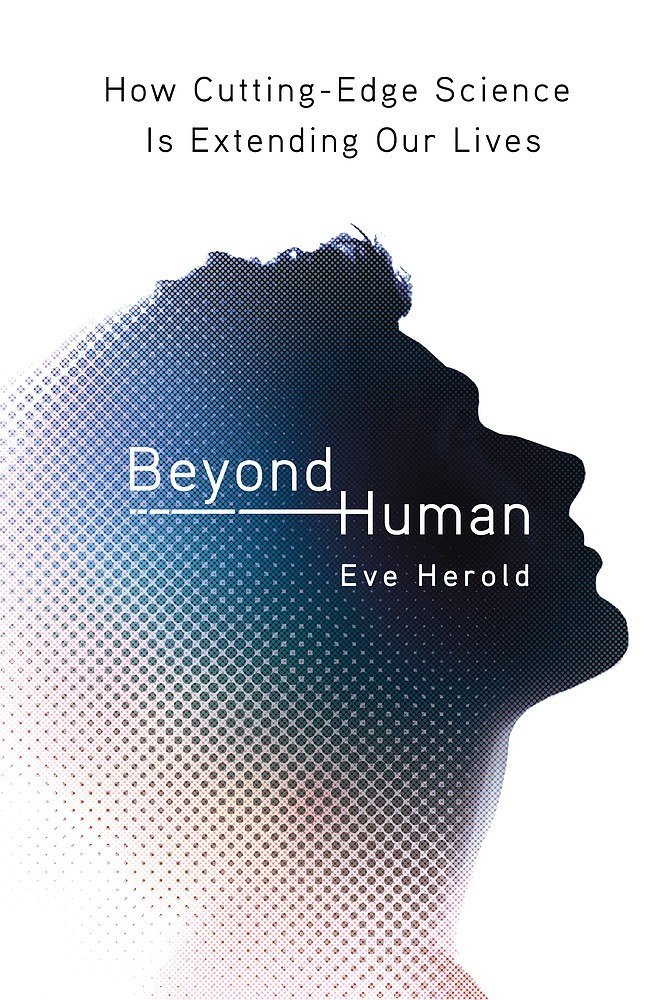
If artificial organs, miniature robots, and advanced medications could keep you healthy, would you want to live for hundreds of years? That’s the question at the heart of Beyond Human: How Cutting-Edge Science Is Extending Our Lives, a new book by health writer Eve Herold, who directs Public Policy Research and Education at the Genetics Policy Institute, which advocates for stem cell research and advanced medicine.
The book explores converging technologies that are available or in development today, with a glimpse of how they may evolve in coming decades to lay the foundation for long-lived transhumans in the future. Herold enlivens what could be fairly dry theory by layering in real-life cases of people using these technologies, as well as a recurring futuristic character named Victor whose life and choices illustrate challenges and ethical quagmires that may face us in this new era.
Those challenges and ethical questions are what spurred Herold to write Beyond Human. She recognizes that these advances will come not all at once, enabling society to take decisive action for or against them, but rather in such tiny increments that many people won’t even notice the changes until they’ve become ingrained in our culture and it’s impossible to shift course. Herold’s goal is to kick off the conversation, educating readers about what’s possible to jump-start important discussions around society’s acceptance of life extension, human enhancement, and more.
But Herold herself is not impartial; she acknowledges that in the course of researching these questions, she found what she calls the bioconservative viewpoint—arguments against using technology to dramatically extend or reshape human life that are based on fears of playing God or going against nature—“less than persuasive.” Still, the book presents both sides of the arguments, allowing readers to reach their own conclusions.
Incorporating arguments from people like age-extension advocate Aubrey de Grey and futurist Ray Kurzweil, Herold tackles many of the thorniest questions that society will face as it becomes more feasible to live well past modern life expectancies, boost neurological function, and incorporate tech directly into our bodies. Among these questions: How will views and mores around reproduction change when the world is full of people who might live for centuries? How will these life-improving tools be allocated to avoid the rise of an elite, superhuman class? If people are kept alive by machines, under what circumstances will they be allowed to die? And who will own the data generated by all this technology, and how will it be protected?
Herold weaves into these thoughtful discussions patient examples and interviews with doctors, ethicists, and developers, providing real feedback from people to shape what might otherwise seem like a far-fetched debate. She covers technologies including artificial organs—like the heart, kidney, lung, liver, and pancreas—as well as neurological implants, brain-computer interfaces, and an array of robots.
In the end, Herold appears won over by the argument that humans have long been on a self-improvement journey, and that today’s efforts to boost our knowledge through education, for instance, are no different from tomorrow’s efforts to boost knowledge by connecting our brains to computers or to each other. Using artificial organs to extend life is just the natural step after using vitamins and surgery to fend off death. It’s a perspective that resonates with humanity’s continual quest for immortality or a fountain of youth, but Herold’s descriptions of bionic people relying on robots and living for hundreds of years were wildly unappealing to me. I identified more with the fictitious Victor’s wife Elaine, who found the life-extending technologies unnatural and refused to avail herself of them when she grew ill.
“Mankind long ago started controlling its destiny, and the only difference is that now we have truly powerful tools to aid in that enterprise,” Herold writes. “Given the rapidly advancing state of technology, the conversation should not be about whether we have the courage to control our destiny, it should be about how we do so.”
Beyond Human: Life Extension, Enhancement, and the Future
If artificial organs, miniature robots, and advanced medications could keep you healthy, would you want to live for hundreds of years? Author Eve Herold's new book "Beyond Human" argues that we might as well get used to these ideas, because they are inevitably coming. Reviewer Salisbury finds this an important overview of a rapidly-developing field of medical science, but is not yet ready to join the immortals herself.
















